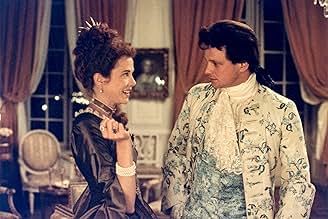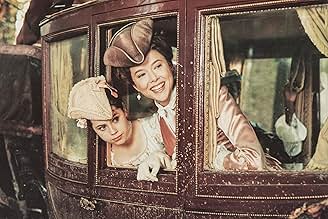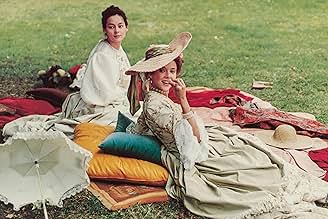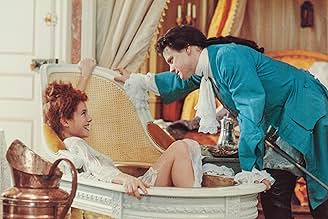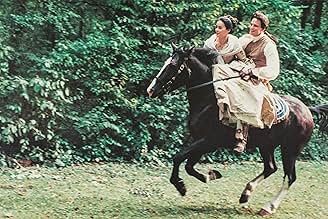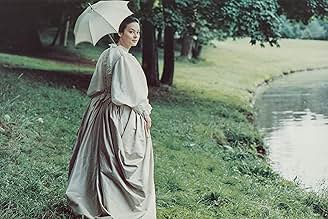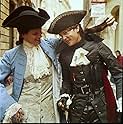ÉVALUATION IMDb
7,0/10
15 k
MA NOTE
Lorsqu'une veuve apprend que son amant doit épouser la fille de son cousin, elle demande à Valmont de prendre la virginité de la fille. Mais d'abord elle le défie de séduire une jeune femme ... Tout lireLorsqu'une veuve apprend que son amant doit épouser la fille de son cousin, elle demande à Valmont de prendre la virginité de la fille. Mais d'abord elle le défie de séduire une jeune femme vertueuse et mariée.Lorsqu'une veuve apprend que son amant doit épouser la fille de son cousin, elle demande à Valmont de prendre la virginité de la fille. Mais d'abord elle le défie de séduire une jeune femme vertueuse et mariée.
- Director
- Writers
- Stars
- Nommé pour 1 oscar
- 3 victoires et 5 nominations au total
Siân Phillips
- Madame de Volanges
- (as Sian Phillips)
Sébastien Floche
- Priest
- (as Sebastien Floche)
Avis en vedette
"Valmont" is a 1989 film based on the novel Les Liaisons Dangereuses by Choderlos de Laclos, as well, of course, the better-known film Dangerous Liaisons starring Glenn Close and John Malkovich.
Here, Annette Benning is the Merteuil who is stunned to learn that her lover, Gercourt (Jeffrey Jones) is betrothed to the fifteen-year-old virginal Cecile (Fairuza Balk). She makes a bet with her Casanova-like friend Valmont (Colin Firth) that he can seduce Cecile so that on her wedding night, she is not a virgin, thus giving Merteuil revenge against Gercourt. Of course, the best-laid plans and all that - Cecile is in love with her music teacher (Henry Thomas), and Merteuil aids and abets the romance as much as possible. But things become more and more complicated, with Valmont, the eternal playboy, actually falling in love himself. And as the story says, once you fall in love, your power is gone.
This film is far superior to the more famous one. Forman is a fantastic director, and the cast warms up what is basically a cold, calculated story and really makes you care.
Annette Bening is more full-dimensional than Close's Martueil - she's beautiful, smart, and she's so sweet and lies so beautifully one has no idea what she's really like. Firth's Valmont is far more believable than Malkoitch's egomaniacal portrayal.
Henry Thomas is the desperately in love music teacher - it's good casting, but he comes off as too modern. It's a minor point because the entire cast is wonderful, including Fabia Drake as Madame de Rosemond, Sian Philips, Meg Tilly, and Fairuza Balik.
The film is beautiful to look at, sumptuously and carefully produced. It's a sad case of being the second film version out when the first was better marketed with a more American cast. Nevertheless, it's not too late to discover this gem.
Here, Annette Benning is the Merteuil who is stunned to learn that her lover, Gercourt (Jeffrey Jones) is betrothed to the fifteen-year-old virginal Cecile (Fairuza Balk). She makes a bet with her Casanova-like friend Valmont (Colin Firth) that he can seduce Cecile so that on her wedding night, she is not a virgin, thus giving Merteuil revenge against Gercourt. Of course, the best-laid plans and all that - Cecile is in love with her music teacher (Henry Thomas), and Merteuil aids and abets the romance as much as possible. But things become more and more complicated, with Valmont, the eternal playboy, actually falling in love himself. And as the story says, once you fall in love, your power is gone.
This film is far superior to the more famous one. Forman is a fantastic director, and the cast warms up what is basically a cold, calculated story and really makes you care.
Annette Bening is more full-dimensional than Close's Martueil - she's beautiful, smart, and she's so sweet and lies so beautifully one has no idea what she's really like. Firth's Valmont is far more believable than Malkoitch's egomaniacal portrayal.
Henry Thomas is the desperately in love music teacher - it's good casting, but he comes off as too modern. It's a minor point because the entire cast is wonderful, including Fabia Drake as Madame de Rosemond, Sian Philips, Meg Tilly, and Fairuza Balik.
The film is beautiful to look at, sumptuously and carefully produced. It's a sad case of being the second film version out when the first was better marketed with a more American cast. Nevertheless, it's not too late to discover this gem.
Cecile (Fairuza Balk) is a 15 year old who has been living in a convent for 6 years. She's happy that her mother Madame de Volanges (Siân Phillips) has arranged a marriage for her to Gercourt (Jeffrey Jones). Volanges trusts her cousin Marquise de Merteuil (Annette Bening) to guide Cecile but she doesn't know that Gercourt discarded Merteuil as his lover. For revenge, Merteuil intends to spoil Cecile's virginity and thereby her pending marriage to Gercourt. She asks her former lover, the Vicomte de Valmont (Colin Firth), to do the seducing but he refuses. He is more interested in bedding the married Madame de Tourvel (Meg Tilly). Merteuil makes an indecent bet with Valmont. Meanwhile Cecile falls for her music teacher Danceny (Henry Thomas).
Director Milo Forman brings a lascivious feeling to the material. The romance is drained out of this which is replaced with something darker. Fairuza Balk is shockingly young which only adds to its forbidden realism. Whereas the great Dangerous Liaisons feels luscious and beautiful, this version feels dirtier and uglier. Annette Bening is wonderful. This is an interesting second look at the same story.
Director Milo Forman brings a lascivious feeling to the material. The romance is drained out of this which is replaced with something darker. Fairuza Balk is shockingly young which only adds to its forbidden realism. Whereas the great Dangerous Liaisons feels luscious and beautiful, this version feels dirtier and uglier. Annette Bening is wonderful. This is an interesting second look at the same story.
I liked this better than Dangerous Liaisons which came out at about the same time. Of course Dangerous Liaisons was very good, and John Malkovich, who played Vicomte de Valmont, is an actor of power, and Glenn Close, who played the Marquise de Merteuil, is highly accomplished, but I preferred the charm of Colin Firth in this film to the brutality of Malkovich, and I thought Annette Bening was just delightful. She played Merteuil with exquisite timing and an ironic witchery and warmth that I shall not soon forget. I preferred her playful, sly wit to Close's cool cynicism.
The story comes from a novel by Choderlos de Laclos set in 18th century France that was made into a stage play by Christopher Hampton. It is a cynical satire on human sexuality as well as a very subtle examination of sexual hypocrisy and desire, a kind of oh so sophisticated laugh at bourgeois morality that would have delighted Voltaire and Moliere and greatly amused Shakespeare. It is a tale of elaborate lechery and revenge that backfires because it seems that anybody, even the most jagged rake can fall in love, and thereby become the victim. The central assumption here is the same as that of the Cavalier poets, namely that marriage kills love. As Merteuil says, "You don't marry your lover."
Meg Tilly played Madame de Tourvel with subtlety and a riveting passion. One of the great sequences in the movie occurs after she has fallen madly in love with Valmont against her will. She stands outside his doorway in the rain for hours looking adoringly and forlornly up at his window. And then she is allowed to enter and receive a cool reception. Valmont says, "Do you want me to lie to you?" and she replies desperately, "Yes," and then it is her passion that overwhelms him, leading to a beautifully ironic twist. Shortly afterward he sees Merteuil, who has become more like a sister than an ex-lover, and says, "I feel awful." She replies, "Are you surprised? (Pause) You are an awful man." Hanging his head he continues, "Do you think a man can change?" "Yes. (Pause) For the worse."
This theme, that it is the beloved who has the power and that once you fall in love you lose all power, is repeated several times in the movie. Valmont pursues women, the harder to get the better, with a relentless and maniacal passion, but once he has them, he immediately loses interest. His making love absentmindedly to Cecile de Volanges (played with wide-eyed innocence and girlish charm by Fairuza Balk) was an incredible irony when we consider what she would cost Gercourt, played with his rather substantial nose in the air by Jeffrey Jones, whom you may recall as the pratfalling principal in Ferris Bueller's Day Off (1986).
There is some insidious philosophy here, some sardonic observations on human nature worth mentioning. One is that the man beloved of women gets most of the reproductive tries, and regardless of his rakishness, is still beloved. Another is that duplicity is the accepted, even required, standard of behavior in society, and that when it comes to sex, one must, perforce, always lie.
Milos Forman's direction was invisible and therefore a work of art. The incidental scenes and backdrops depicting the color, squalor and decadence of pre-revolutionary France added just the right amount of atmosphere. The costumes were stunning and much cleaner than they would have been in reality. The elegance and beauty of all the titled people merrily contrasted with the crude ugliness of the common people, rightly reflecting the effete snobbery of the aristocracy before the time of the guillotine.
(Note: Over 500 of my movie reviews are now available in my book "Cut to the Chaise Lounge or I Can't Believe I Swallowed the Remote!" Get it at Amazon!)
The story comes from a novel by Choderlos de Laclos set in 18th century France that was made into a stage play by Christopher Hampton. It is a cynical satire on human sexuality as well as a very subtle examination of sexual hypocrisy and desire, a kind of oh so sophisticated laugh at bourgeois morality that would have delighted Voltaire and Moliere and greatly amused Shakespeare. It is a tale of elaborate lechery and revenge that backfires because it seems that anybody, even the most jagged rake can fall in love, and thereby become the victim. The central assumption here is the same as that of the Cavalier poets, namely that marriage kills love. As Merteuil says, "You don't marry your lover."
Meg Tilly played Madame de Tourvel with subtlety and a riveting passion. One of the great sequences in the movie occurs after she has fallen madly in love with Valmont against her will. She stands outside his doorway in the rain for hours looking adoringly and forlornly up at his window. And then she is allowed to enter and receive a cool reception. Valmont says, "Do you want me to lie to you?" and she replies desperately, "Yes," and then it is her passion that overwhelms him, leading to a beautifully ironic twist. Shortly afterward he sees Merteuil, who has become more like a sister than an ex-lover, and says, "I feel awful." She replies, "Are you surprised? (Pause) You are an awful man." Hanging his head he continues, "Do you think a man can change?" "Yes. (Pause) For the worse."
This theme, that it is the beloved who has the power and that once you fall in love you lose all power, is repeated several times in the movie. Valmont pursues women, the harder to get the better, with a relentless and maniacal passion, but once he has them, he immediately loses interest. His making love absentmindedly to Cecile de Volanges (played with wide-eyed innocence and girlish charm by Fairuza Balk) was an incredible irony when we consider what she would cost Gercourt, played with his rather substantial nose in the air by Jeffrey Jones, whom you may recall as the pratfalling principal in Ferris Bueller's Day Off (1986).
There is some insidious philosophy here, some sardonic observations on human nature worth mentioning. One is that the man beloved of women gets most of the reproductive tries, and regardless of his rakishness, is still beloved. Another is that duplicity is the accepted, even required, standard of behavior in society, and that when it comes to sex, one must, perforce, always lie.
Milos Forman's direction was invisible and therefore a work of art. The incidental scenes and backdrops depicting the color, squalor and decadence of pre-revolutionary France added just the right amount of atmosphere. The costumes were stunning and much cleaner than they would have been in reality. The elegance and beauty of all the titled people merrily contrasted with the crude ugliness of the common people, rightly reflecting the effete snobbery of the aristocracy before the time of the guillotine.
(Note: Over 500 of my movie reviews are now available in my book "Cut to the Chaise Lounge or I Can't Believe I Swallowed the Remote!" Get it at Amazon!)
Milos Forman's Valmont is ultimately no better and no worse an adaptation of Les Liaisons Dangereuse than Dangerous Liaisons by Stephen Frears which made it into theaters months earlier. Both are entertaining, yet both dip into tedium around the three-quarter point because the web of aristocratic intrigues they are following gets too tangled for a two-hour screen treatment.
"Valmont" occupies a wider canvas which encompasses visual reminders that the privileged central characters live amidst a largely impoverished society. As soon as horse-drawn carriage gallops away from palace or mansion, the squalid reality of the streets of Paris is revealed. Frears's "DL" is able to show the same difference by closing in on relationships such as the intimate master-servant morning rituals that open his film. Forman's "Valmont" humanizes the main characters by toning down their cruelty and blunting their extremes. By contrast, in "DL" Glenn Close plays the Comtesse de Merteuil with a cold reserve that dissolves into hysteria whereas Annette Bening in "V" exudes a high-wattage, tightly controlled gaiety which remains more or less constant throughout. Colin Firth's Valmont is more dashing and virile than John Malkovich's, but his performance lacks the corrupt menace which Malkovich provides in overly strong doses. Firth's seduction of the young Cecile (Fairuza Balk), is brilliantly conceived, staged and performed. Meg Tilly as Mme. De Tourvel has a simplicity and vulnerability that eluded Michelle Pfeiffer in DL, and Tilly doesn't strain for effects. She and Firth are also a better physical match, and the development of their relationship makes more sense here. Henry Thomas as the music tutor in love with young Cecile has much more screen time than Keanu Reeves in DL, which is all for the better because he has the acting chops to pull it off – a 17-year-old with more principles and purity than all of the adults in his orbit combined. Whereas "Valmont" is a diffuse and leisurely satire, DL is a highly stylized tragedy.
"Valmont" occupies a wider canvas which encompasses visual reminders that the privileged central characters live amidst a largely impoverished society. As soon as horse-drawn carriage gallops away from palace or mansion, the squalid reality of the streets of Paris is revealed. Frears's "DL" is able to show the same difference by closing in on relationships such as the intimate master-servant morning rituals that open his film. Forman's "Valmont" humanizes the main characters by toning down their cruelty and blunting their extremes. By contrast, in "DL" Glenn Close plays the Comtesse de Merteuil with a cold reserve that dissolves into hysteria whereas Annette Bening in "V" exudes a high-wattage, tightly controlled gaiety which remains more or less constant throughout. Colin Firth's Valmont is more dashing and virile than John Malkovich's, but his performance lacks the corrupt menace which Malkovich provides in overly strong doses. Firth's seduction of the young Cecile (Fairuza Balk), is brilliantly conceived, staged and performed. Meg Tilly as Mme. De Tourvel has a simplicity and vulnerability that eluded Michelle Pfeiffer in DL, and Tilly doesn't strain for effects. She and Firth are also a better physical match, and the development of their relationship makes more sense here. Henry Thomas as the music tutor in love with young Cecile has much more screen time than Keanu Reeves in DL, which is all for the better because he has the acting chops to pull it off – a 17-year-old with more principles and purity than all of the adults in his orbit combined. Whereas "Valmont" is a diffuse and leisurely satire, DL is a highly stylized tragedy.
Milos Forman's version of 'Dangerous Liasons' was relegated to the second tier at the time of its release, which occurred close on the heels of Stephen Frears' version starring Glenn Close and John Malkovitch. I saw them both in the theatre when they were released and from the start enjoyed Forman's film far more than Frears'.
Annette Beining is a wonderful Madame de Mertueil, beautiful, intelligent, ruthless and in the end tragic. Glenn Close is pretty two-dimensional by comparison for Frears. And Colin Firth is more the laughing cavalier, with a heart, than was John Malkovitch for Frears, who mostly grimaces smugly and is highly distasteful and ego-centric. I liked Firth's sense of humor about himself, it makes the ending more poignant.
On paper some of the casting of Forman's version seems questionable, but all, except one, work very well. Most surprising was Henry Thomas's young lover. Thomas can be a dull actor but his reticent performance is apt for the gauche young man learning the ropes of 18th century Parisian society. Fairuza Bulk is delightful and funny as the virginal Céline. The supporting cast, notably Fabia Drake's dotty old Madame de Rosemond, are excellent. Siân Philips and Jeffrey Jones provide some very funny moments, though their characters are anything but "funny".
Only Meg Tilly falls short. Her American accent and modern delivery of the lines is disappointing. But she is a good actress and manages to convince in the end, though a more "Frenchified" performer would have served the story more effectively.
The music, cinematography and choreography are superb. The settings are very beautiful.
Forman's 'Valmont' deserves to be reconsidered by those critics who found it lacking when it first appeared.
Annette Beining is a wonderful Madame de Mertueil, beautiful, intelligent, ruthless and in the end tragic. Glenn Close is pretty two-dimensional by comparison for Frears. And Colin Firth is more the laughing cavalier, with a heart, than was John Malkovitch for Frears, who mostly grimaces smugly and is highly distasteful and ego-centric. I liked Firth's sense of humor about himself, it makes the ending more poignant.
On paper some of the casting of Forman's version seems questionable, but all, except one, work very well. Most surprising was Henry Thomas's young lover. Thomas can be a dull actor but his reticent performance is apt for the gauche young man learning the ropes of 18th century Parisian society. Fairuza Bulk is delightful and funny as the virginal Céline. The supporting cast, notably Fabia Drake's dotty old Madame de Rosemond, are excellent. Siân Philips and Jeffrey Jones provide some very funny moments, though their characters are anything but "funny".
Only Meg Tilly falls short. Her American accent and modern delivery of the lines is disappointing. But she is a good actress and manages to convince in the end, though a more "Frenchified" performer would have served the story more effectively.
The music, cinematography and choreography are superb. The settings are very beautiful.
Forman's 'Valmont' deserves to be reconsidered by those critics who found it lacking when it first appeared.
Le saviez-vous
- AnecdotesMeg Tilly and Colin Firth fell in love while they were making the film. A year later they had a son together.
- GaffesWhen Tourvel is in the market, she places several food items in her basket one after the other. However, every time she does so, the basket appears empty even though she had just placed something in it a moment before.
- Bandes originalesDivertimento for Winds in B Flat Major, K240
Wolfgang Amadeus Mozart
Performed by the orchestra of the The Academy of St. Martin-in-the-Fields
Meilleurs choix
Connectez-vous pour évaluer et surveiller les recommandations personnalisées
- How long is Valmont?Propulsé par Alexa
Détails
- Date de sortie
- Pays d’origine
- Langue
- Aussi connu sous le nom de
- Valmont. Relaciones peligrosas
- Lieux de tournage
- Château de la Motte-Tilly, Nogent-sur-Seine, Aube, France(Madame de Rosemonde's estate)
- sociétés de production
- Consultez plus de crédits d'entreprise sur IMDbPro
Box-office
- Budget
- 33 000 000 $ US (estimation)
- Brut – États-Unis et Canada
- 1 132 112 $ US
- Fin de semaine d'ouverture – États-Unis et Canada
- 96 008 $ US
- 19 nov. 1989
- Brut – à l'échelle mondiale
- 1 132 112 $ US
- Durée
- 2h 17m(137 min)
- Couleur
- Rapport de forme
- 2.39 : 1
Contribuer à cette page
Suggérer une modification ou ajouter du contenu manquant






